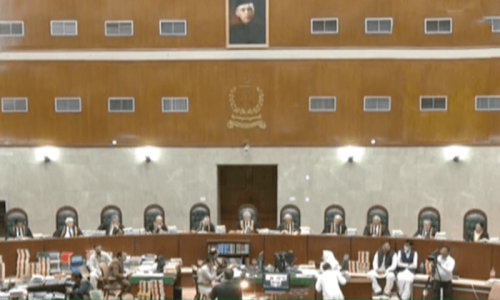ISLAMABAD: Educational institutions are independent to follow their own policy for admission and thus the academic, administrative and disciplinary autonomy of the university must be respected, Justice Muhammad Ali Mazhar observed on Monday, saying that interference by courts in their admission policies could give rise to glitches.
Justice Mazhar was a member of a three-judge Supreme Court bench, consisting of Chief Justice of Pakistan (CJP) Qazi Faez Isa and Justice Mussarat Hilali, that had taken up a set of appeals against the Peshawar High Court orders of Feb 21, 2013 and Oct 7, 2013 and Lahore High Court’s Jan 17, 2017 order.
Except for Oct 7 PHC order, all the high court judgements were set aside by the Supreme Court.
The appeals were filed by the Pakistan Engineering Council (PEC) and Taj Muhammad Khan of Multan Electric Power Company.
Sets aside high court judgements, holds BTech is not equivalent to BSc
The issue emerged when Muhammad Sadiq, a respondent in one of the cases, applied for admission in MSc Engineering in Khyber Pakhtunkhwa University of Engineering and Technology, Peshawar. During scrutiny it was revealed that the respondent did not possess the pre-requisite qualification for admission to the MSc programme since, according to the university rules, the qualification of B.Tech (Hons) was not considered equivalent to BSc Engineering.
The respondent had filed a petition in the PHC, which was allowed on Feb 21, 2013.
Likewise, in another case, one of the appellants obtained a B.Tech degree from KP University of Engineering and Technology and applied for recruitment for the post of assistant executive engineer (BPS-17) in Pakistan Railways’ civil engineering department.
The candidature of the appellant was provisionally accepted and he was told to provide his registration certificate to the PEC, but he failed to do so, resulting in the rejection of his candidature.
The appellant had filed a petition in the PHC which was dismissed on Oct 7, 2013.
The third case concerned the filing of a petition before the LHC in which the petitioner holding a B.Tech (Hons) in Electrical (Power) Technology challenged allocation of seats.
Authored by Justice Mazhar, the judgement said the educational institutions were competent to manage their own affairs without any outside intervention from executive or judicial organs, unless they contravene or disregard the compass of their authority or act in breach of applicable statutes or admission policies as laid down in the prospectus.
“Nothing on record shows that while cancelling admission of the respondent in the first case, the university committed any act in violation of their rules and regulations. The petitioner failed to achieve the admission criteria and hence, he was not entitled to admission.
“It was neither fair nor just or equitable to interfere in the affairs falling into the exclusive domain of the university and its academia and, therefore, the PHC was not justified to intervene in the admission policy which does not seem to be discriminatory or unlawful, but a fair benchmark for applying for admission in the MSc degree programme,” the verdict said.
The judgement cited a Nov 15, 2019 decision by the Higher Education Commission’s (HEC) Equivalence and Accreditation Committee declaring that degrees of BSc (Engineer) and B.Tech (Hons) were not equivalent, but could be considered on a par for employment, grade, promotion, etc. in their respective cadre/streams.
The SC judgement said the criteria set for admission explained that both degrees — BSc (Engineering) and B.Tech (Hons) — were distinct with the rider that if a person who qualified B.Tech (Hons) applied for admission to Engineering Bachelor’s degree programme offered by engineering institutions and universities, he can avail certain exemptions subject to assessment of courses and satisfying PEC regulations.
“Thus the gist of documents placed before us unequivocally demonstrate that the degree of B.Tech (Hons) is not equivalent to BE degree, but both are two distinct disciplines of knowledge in the field of engineering and technology with distinct syllabi and programme objectives but may be treated at a par for recruitment, pay scales and grades.
“The Bachelor of Science in Engineering emphasises theories and advanced concepts, while an Engineering Technology degree emphasises hands-on application and implementation with the major difference that BE is more knowledge-based while B.Tech is skill-oriented,” the judgement explained.
Published in Dawn, April 16th, 2024












































Dear visitor, the comments section is undergoing an overhaul and will return soon.